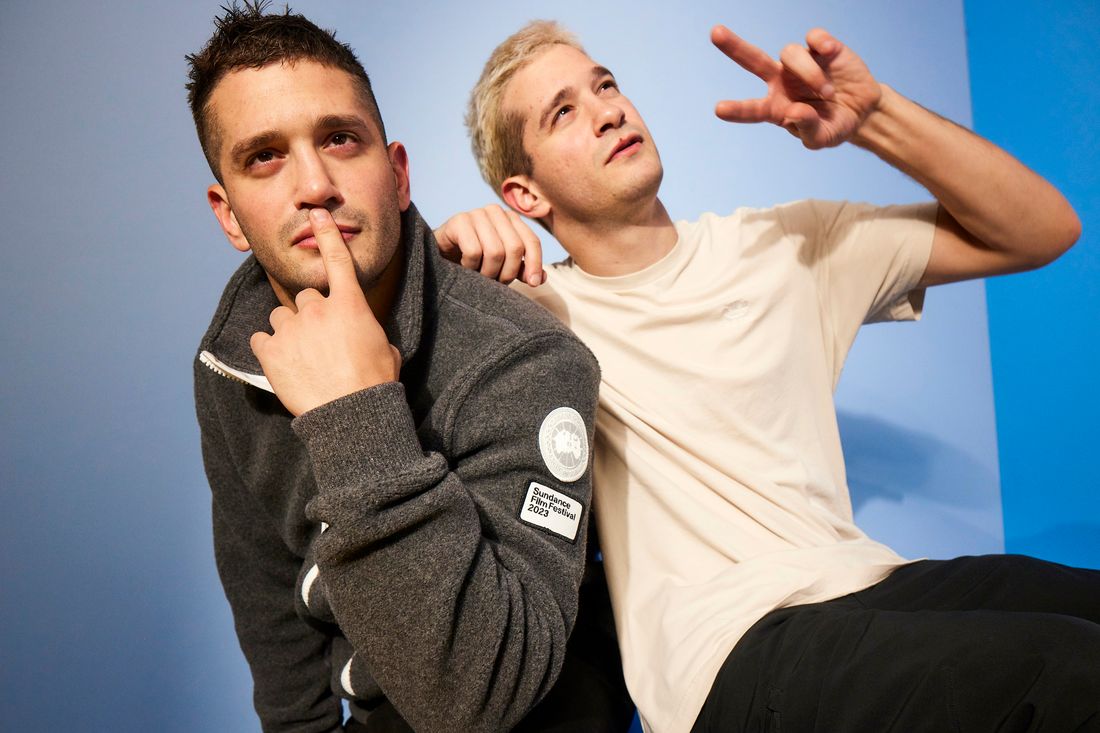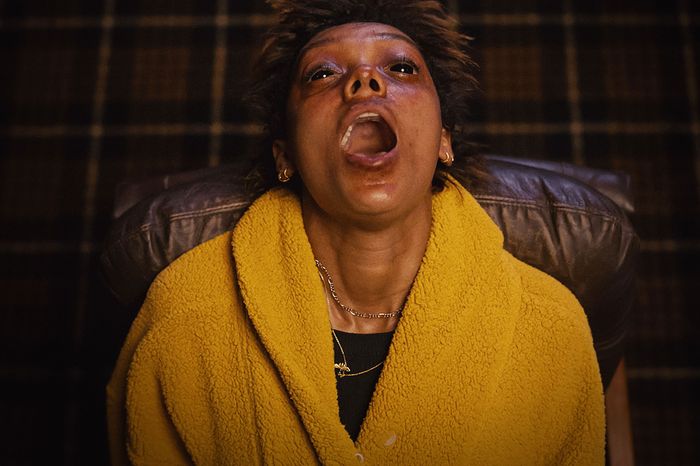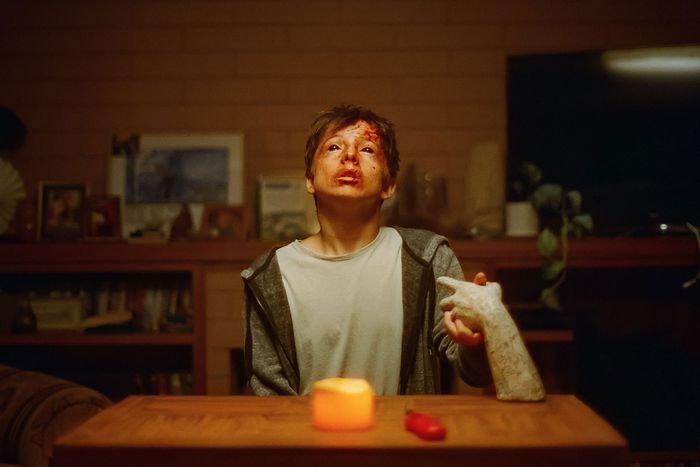
In January, one movie exploded out of the anonymous ranks of microbudget indie passion projects playing in competition at Sundance — with no name recognition, no bankable stars, no distribution deal — to become arguably the breakthrough discovery of the festival. Talk to Me is an Australian supernatural horror–thriller in which bored suburban teens chronicle demonic possessions and the conjurings of spirits (achieved by shaking the embalmed hand of a “powerful medium”) on social media for shits and giggles. The movie’s co-directors? Danny and Michael Philippou, excitable 30-year-old Adelaide-born twins who have amassed a body of award-winning, pop-culture skewering, comically violent videos (as well as a passionate, 6.74 million–strong YouTube following) under the nom de vlog RackaRacka.
In the days leading up to Talk to Me’s premiere at Sundance’s ghouls-and-gore-leaning Midnight section, the first-time feature filmmakers were fêted widely by agents, producers, and production execs; the brothers stayed up multiple nights fielding offers from studios and production companies, including Jordan Peele’s Monkeypaw Productions and the low-budget juggernaut Blumhouse. Then, upon its ecstatic Egyptian Theatre public debut (at which no less an eminence than fright-film phenom Ari Aster sat front-row center), the movie triggered an all-out bidding war — Neon, Universal, Searchlight, and Sony among those in the running. Suddenly, reps for Steven Spielberg and Stephen King were requesting screening links, and horrormeister James Wan’s production company Atomic Monster arranged a general meeting with the brothers. In perhaps the foremost indication they had crossed an invisible threshold in Hollywood, the town’s major talent agencies began hotly competing to sign them (with the powerhouse WME walking away with bragging rights). Deal-wise, the Philippous threw in their lot with art-house cool-kid studio A24, which will theatrically release Talk to Me on July 28.
January’s head-spinning series of events seemed to herald the arrival of a new filmmaking force in the form of two fast-talking film bros from the literal other end of the earth. But on a sunny summer afternoon at Los Angeles’s Hollywood Forever cemetery recently, the Philippous were momentarily less fixated on the birth of their new career iteration than on the dearly departed. “Is it all filmmakers in the cemetery?” Michael asks, stepping out of a chauffeur-driven car with a pair of oversize earphones wrapped around his neck. Danny follows, his hair currently a bright magenta. Together, we gaze at the cowboy-hatted bust of Burt Reynolds, rocker Johnny Ramone shredding on an electric guitar, and the bronze likeness of Toto from The Wizard of Oz.
We wend our way around Hollywood Forever’s artificial lake, and the brothers explain how they came to their calling: through picking up a video camera at age 8 and convincing neighborhood kids in the Adelaide suburb of Pooraka (the name RackaRacka pays oblique homage to their hometown) to act out cartoonishly violent scenes of backyard wrestling and homemade horror. “In the beginning, it was like Lord of the Flies,” Michael says. “We’d get together every weekend and just beat the shit out of each other.” As teens, the two taught themselves the rudiments of filmmaking via a series of shorts they called The Evil Flamingo (a “rip-off of Chucky,” Danny explains) and ten “seasons” of their never-aired Buffy the Vampire Slayer spoof, Tamuffy. Before they’d graduated from high school, the brothers had begun developing a knack for going viral. They filmed fake “fail” videos, in which they stuck knives into a toaster and seemingly blew them up, for example, and caught the attention of American late-night talk shows, including Jimmy Kimmel Live! and Conan. “We were just posting,” says Michael. “We did one video, went to sleep. Woke up the next day, it was at 500,000 views. At the end of that day, it was 1.5 million. We got 100,000 subscribers. And the news wanted to talk to us.”
While working unpaid, low-level jobs on local productinos, they found inventive ways to subsidize their art — experimental-drug trials among them. “I would take these random pharmaceuticals, then just constantly get my blood taken to test what the side effects were,” remembers Danny. “That’s how I got money to buy my first camera.”
After high school, a one-year filmmaking course called MAPS taught them the basics. But they honed the rest of their craft through plain trial and error, learning visual effects, sound design, color correction, and cinematography while making dozens of YouTube shorts with titles like “Attacked by the McDonald’s Manager,” “Teaching Kids How to Fight!,” and “Builders of the Apocalypse.” (Referencing comic-book characters and fast food, video games and professional wrestling, RackaRacka content tends to showcase lowbrow humor with surprisingly high production values: goofily engrossing shortform guerrilla videos with stirring musical cues and eye-popping VFX that more often than not feature one or both Philippou brothers in some state of humiliation or danger.) “We didn’t want to rely on anyone else,” says Danny. Their greatest challenge, as Michael puts it, was to repeatedly “make nothing look like something” — and to make it cinematic.
Did any filmmakers in particular inspire their output in those early days? “The energy of Racka is inspired by Xena: Warrior Princess, which I am so obsessed with,” answers Danny.
In 2012, the pair ventured beyond the fizzy action-comedy-horror mayhem of their RackaRacka personae to film the short Deluge, about a farmer and his son enmeshed in a suicide cult. Also around that time, Michael served as a production assistant and Danny interned on writer-director Jennifer Kent’s Adelaide-set art-house horror hit The Babadook. Kent’s way of working was a revelation. “She was the first director I saw that cared about what she was making,” Michael says. “It didn’t matter how long it took. It was like, We’re going to keep going until we get the shot. Every night, she’d obsess over the next day. She would not break from her vision, no matter what.”
Fatefully, the brothers also made personal inroads with Causeway Films, the then–newly minted production company behind The Babadook, whose executives encouraged the Philippous to pull together a feature script. Daley Pearson, a colleague they had worked with on a previous television project, had an idea for a short film about “kids using demons and possession as a party drug.” Danny took a pass at the script, shifting its comedic tone to one that was straight-ahead scary and writing 80 pages “on spec” before enlisting a co-writer, Bill Hinzman. (Michael, in the meantime, maintained the brothers’ YouTube channel.) They submitted the screenplay to Causeway. “Once I sent them the first draft of Talk to Me, they were in,” Michael recalls. “It was incredible. They really took a gamble on us. Because YouTubers sometimes don’t make the best filmmakers. There’s so many examples of YouTubers fucking up films.”
“There’s definitely a stigma that comes with being a YouTuber,” adds Danny. The three of us pause in front of Hollywood Forever’s peafowl enclosure: a wood-and-chicken-wire cage teeming with live peacocks, several fanning out their tail plumage. “This is the most random cemetery I’ve ever been in,” he observes.
The brothers’ path to overnight success decelerated soon after they turned in that first draft, though. With Causeway’s backing, they began shopping Talk to Me around Hollywood, getting turned down by every major studio save for one, which they refuse to name. “We started getting these creative notes steering it into this stereotypical, boring direction,” says Michael. “‘Oh, we need to investigate this hand more.’ And ‘The kids need to learn how to defeat it.’ I’m like, Dude, I’m so bored listening to this.”
“That’s the thing with creative control: You always hear those horror stories from Hollywood where someone signs on to something and then the project gets ripped away from them,” adds Danny. “We have such a strong vision of how we want it to look, down to every frame that gets cut. Doing that with someone who says, ‘No, we’re taking over now’ — I just wouldn’t respond well to that. [Causeway] was like, ‘If we do it independently in Australia, our way, then we have a lot more control. Even though it’s a third or half the budget.’”
In preparation for our interview, executives at A24 cautioned the brothers, “Whatever you do, don’t discuss the budget.” But they reveal that Talk to Me “cost less than $4.5 million USD” to produce with funding from a private-investment firm as well as the governmental media agency Screen Australia. The Philippous’ insistence on casting Australian actress Sophie Wilde in the lead role of Mia — a high-school senior grieving the death of her mother who uses demon-possession as a kind of ad hoc séance, accidentally unleashing supernatural chaos in the process — however, created certain budgeting complexities. “We lost money by casting Sophie,” Danny says. “Because she wasn’t a name. But she is so good. The camera loves her! Every single aspect of performance, she would nail it every time. We reinvested all our fees. Causeway reinvested all their fees. We’re like, ‘Let’s go all-in!’ Then our lawyer is like, ‘Don’t do that. Only 8 percent of Australian films make their budget back.’ He’s like, ‘You’re never going to see a dollar.’”
“That didn’t really matter to us,” says Michael, “because we weren’t there to make money. It’s like, We’re making a movie. And anything you can do to make it even one percent better, we’re going to do that. That was the roll of the dice.”
In an ironic foreshadowing of the film’s future, the co-directors, producers, and crew members often goofed around about the creative direction Talk to Me was taking in anticipation of submission to a particular Park City–set film festival. “The joke on set was always ‘This is very Sundance,’” Danny says. “‘It’s very A24.’”
“When we were editing, it was like, ‘That’s not very A24 of you, that frame,’” continues Michael. “‘You’re going to linger on that? That’s not very artsy of you.’”
Owing to what they describe as “impostor syndrome or something,” however, the brothers didn’t necessarily expect to have their debut feature accepted to Sundance. Causeway presold distribution rights to various international territories with a promo reel that screened around the Cannes Film Market the May before but only hoped for an offer in the $500,000 range for North American rights. “We submitted it to Sundance and were like, Cool. Anyway,” says Michael. “There was, in our mind, not even a flicker of a chance.” The Philippous still seem thunderstruck by the reception — and the offers — they and the film received in Utah.
Causeway and the Philippous turned down a larger offer from a competing studio to release Talk to Me with A24 — a company that has consistently punched above its weight, putting out genre movies originally launched at Sundance (Aster’s Hereditary and director Robert Eggers’s The Witch among them) — for a reportedly “high seven figures” sum. “A whole bunch of companies made offers. One made a bigger offer than the A24 one,” says Danny. “The turning point for us was everyone else was faces on calls. A24 met with us in person. They made an offer, left. Then they got even more people, one of the CEOs of the company; they all flew back from New York to Sundance to speak to us again. That sort of thing was like, Oh, fuck. These people are committed!” (In a statement to Vulture, A24 said, “We were blown away with the film and made an offer as soon as we left the theater.”)
In the final lead-up to Talk to Me’s release, the brothers have been unfaltering in their commitment to their day job. Last month, under the guise of RackaRacka, the Philippous attended Anaheim, California’s VidCon, a distinctly Gen-Z-leaning, Comic-Con-esque massing of creators from across TikTok and YouTube, to meet and greet fans. And despite their burgeoning acclaim as Serious Filmmakers, the brothers have no intention of forsaking their digital renown. “We’re never going to walk away from YouTube,” Michael says. “That’s how we came up. We want to give back to fans because they’re the ones who helped us get here.”
In another indication of the brothers’ ambition, the conclusion of Talk to Me leaves the door ajar for further sequelization in what has the very real potential to become a long-running franchise for A24 à la Wan’s Saw. The Philippous say they would jump at the chance to do a follow-up installment. Toward that end, they’ve already drafted a “mythology bible,” filling in blanks surrounding a TTM cinematic universe. “We really want to do an action film, really badly want to do another horror film,” Danny says. “But our goals are just to keep making stuff.”
“Man, we have scripts and scripts. We’ve got ideas. We got character. We got scenes,” Michael continues. “It’s to an annoying point; we’ve got to start making stuff. The bigger ideas, we’ve just brushed the surface. We’re ready to go. Sign us up.”
More From This Series
- Mike Leigh Knows Someone Like Pansy in Real Life, Too
- The Melodrama of Robert Eggers
- Making a Movie in Secret, and Living With the Repercussions




